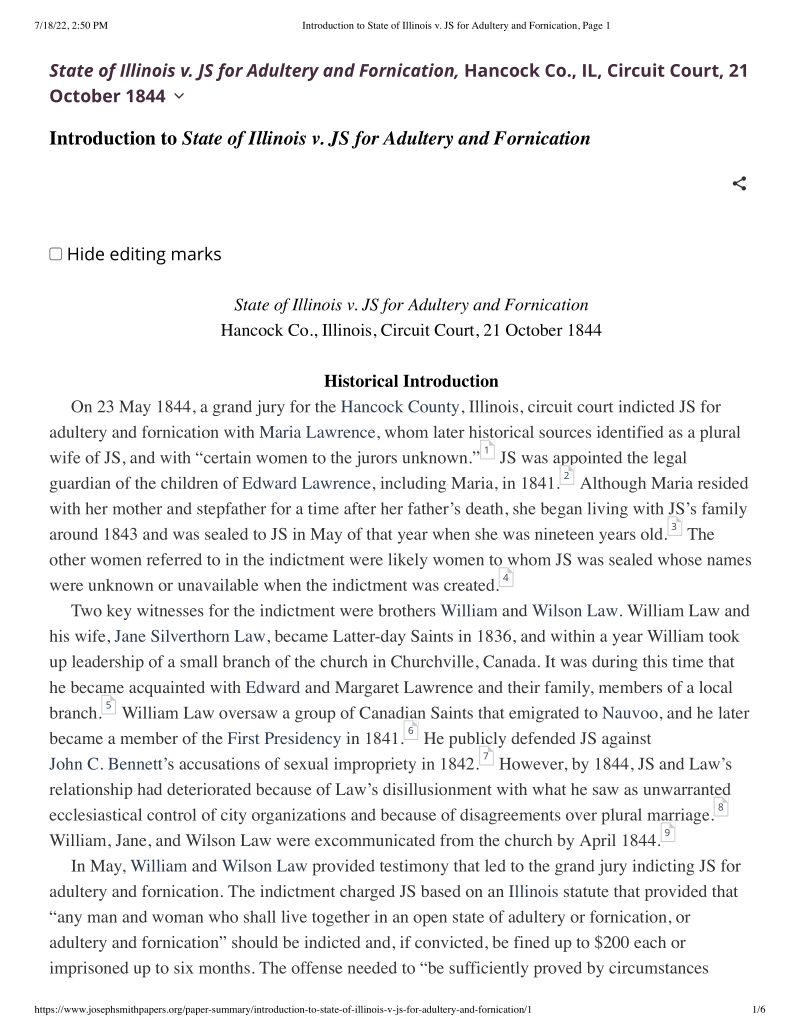The Joseph Smith Papers summarizes the case of State of Illinois v. Joseph Smith for allegedly violating anti-adultery laws.
- Type
- Website
- Source
- The Joseph Smith Papers LDS
- Hearsay
- DirectSecondary
- Reference
"Introduction to State of Illinois v. JS for Adultery and Fornication," The Joseph Smith Papers Website, accessed July 18, 2022
- Scribe/Publisher
- The Joseph Smith Papers
- Audience
- Reading Public
- Transcription
State of Illinois v. JS for Adultery and Fornication
Hancock Co., Illinois, Circuit Court, 21 October 1844
Historical Introduction
On 23 May 1844, a grand jury for the Hancock County, Illinois, circuit court indicted JS for adultery and fornication with Maria Lawrence, whom later historical sources identified as a plural wife of JS, and with “certain women to the jurors unknown.” JS was appointed the legal guardian of the children of Edward Lawrence, including Maria, in 1841. Although Maria resided with her mother and stepfather for a time after her father’s death, she began living with JS’s family around 1843 and was sealed to JS in May of that year when she was nineteen years old. The other women referred to in the indictment were likely women to whom JS was sealed whose names were unknown or unavailable when the indictment was created.
Two key witnesses for the indictment were brothers William and Wilson Law. William Law and his wife, Jane Silverthorn Law, became Latter-day Saints in 1836, and within a year William took up leadership of a small branch of the church in Churchville, Canada. It was during this time that he became acquainted with Edward and Margaret Lawrence and their family, members of a local branch. William Law oversaw a group of Canadian Saints that emigrated to Nauvoo, and he later became a member of the First Presidency in 1841. He publicly defended JS against John C. Bennett’s accusations of sexual impropriety in 1842. However, by 1844, JS and Law’s relationship had deteriorated because of Law’s disillusionment with what he saw as unwarranted ecclesiastical control of city organizations and because of disagreements over plural marriage. William, Jane, and Wilson Law were excommunicated from the church by April 1844.
In May, William and Wilson Law provided testimony that led to the grand jury indicting JS for adultery and fornication. The indictment charged JS based on an Illinois statute that provided that “any man and woman who shall live together in an open state of adultery or fornication, or adultery and fornication” should be indicted and, if convicted, be fined up to $200 each or imprisoned up to six months. The offense needed to “be sufficiently proved by circumstances which raise the presumption of cohabitation and unlawful intimacy.” Each additional offense would increase the punishment. Based on this statute, the grand jury indicted JS on three counts. The first count claimed JS lived “in an open state of adultery” with Lawrence on and before 12 October 1843; the second, encompassing the same time frame, asserted he was openly engaging in adultery and fornication with “certain women to the jurors unknown”; and the final count charged him with committing adultery with unidentified women on or before 1 January 1844. On a motion from prosecuting attorney E. A. Thompson, the court discharged JS on 24 May. It is unknown why Thompson made this motion; it may have been due to the incomplete nature of the indictment and apparent confusion about specific dates contained therein.
Later that day, William and Wilson Law provided additional witness testimony and the grand jury issued a second indictment containing five counts. This new indictment omitted the 1 January 1844 count that was listed in the first indictment, split the charge of adultery and fornication with Lawrence into two counts while revising the time frame to between 12 October 1843 and 24 May 1844, added another count of adultery with Lawrence on 12 October 1843, and expanded charges of adultery and fornication with unidentified women into two counts—one dated between 10 July 1843 and 24 May 1844, and the other dated within the eighteen months prior to 24 May. Court records do not reveal the substance of Wilson and William Law’s testimonies or the circumstances culminating in the issued indictment. However, the counts in the indictment dated 10 July 1843 were likely an attempt to connect the alleged incidents with the revelation on eternal and plural marriage, which was dictated on 12 July 1843, and JS’s intent to enact its principles.
JS publicly condemned William and Wilson Law for their role in the adultery indictment days after it was issued, claiming the indictment was “of the devil—all corruption” and calling them “false swearers.” He traveled to Carthage, Illinois, on 27 May to answer indictments of perjury and adultery at the Hancock County Circuit Court. The court issued subpoenas for Wilson and William Law, Alexander Sympson, Robert D. Foster, Joseph H. Jackson, and John Snider, but Snider was apparently not served. The Laws entered into a recognizance for $100 to appear at the October court term.
After the 27 May hearing, JS instructed John Taylor to pursue lawsuits against the Laws and Foster for perjury and slander against Maria Lawrence, yet there is no record of Taylor doing so. On 22 June, the court issued a writ of capias for Hancock County sheriff Miner R. Deming to hold JS for $300 bail to appear at the October 1844 court term to answer charges of adultery and fornication, but the capias apparently was not served. Because JS was killed on 27 June, the adultery and fornication suit was abated on 21 October.
- Citations in Mormonr Qnas
The B. H. Roberts Foundation is not owned by, operated by, or affiliated with the Church of Jesus Christ of Latter-day Saints.

